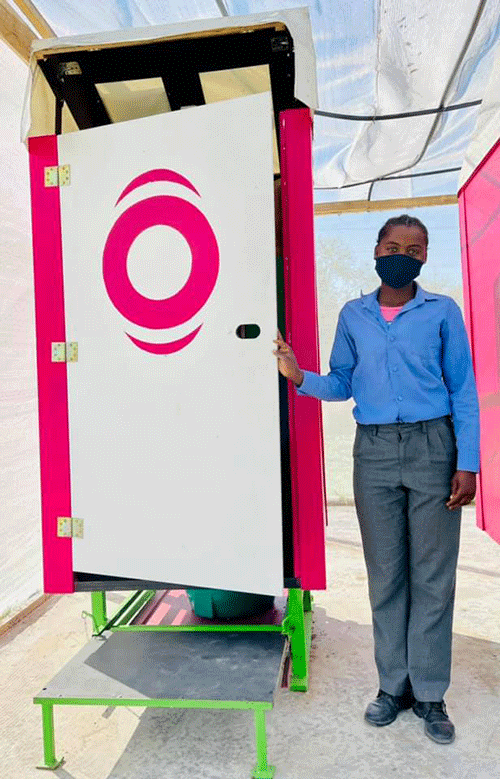Seeing his grandmother walk a long distance from the homestead to relieve herself in nature, prompted Kaveto Tjatjara to come up with an eco-toilet that will make life easier for rural residents.
Tjatjara (31) then started working on the project to introduce waterless toilets that can work in areas without sewerage infrastructure.
Recently, the Rundu-born entrepreneur donated a waterless eco-friendly toilet called Flushh to the Siguruguru Primary School in the Tumweneni informal settlement of the Kavango East.
The toilet, which is valued at N$ 11 000, will cater for the 357 pupils enrolled at the school.
“The toilet is waterless, so when you “flush”, instead of water, sawdust is used as a cover material. In addition, highly-trained sanitation workers safely collect the cartridge and transport it to our composting facility, where we are working on transforming it into valuable by-products such as briquettes (used for fuel as well as for kindling to start a fire) which can be a source of energy,” detailed Tjatjara.
The sawdust is collected local carpentry companies that would normally throw it away as waste.
He noted that the life faced by young people comes with big problems such as climate change, and water will be a scarce resource, especially for a desert country like Namibia.
Tjatjara emphasised that this is why it is important to start building more sustainable systems now to use every day, and young people are key partners in driving that change.
“More than one million people in Namibia live without access to safely-managed sanitation solutions; this problem is getting worse.”
According to the education management information system, for 2017, 70 schools in the Kavango West had no toilets, while 106 had such facilities.
He said they are still at an early-stage social venture, but have already seen tremendous health and productivity benefits from their pilot projects.
“We conducted a 12-week pilot experiment in a household that was previously sharing a communal toilet with 1 000 other people.”
Tjatjara explained that the conditions of the communal pit latrine are usually unhygienic and a high risk of spreading diseases such as Hepatitis E or cause diarrhoea.
“With our solution, the family did not have to walk to go use a communal toilet, but could use one in their own home; one that was clean and hygienic and saved them valuable time.”
They are now focusing on building a sanitation system for schools through the container-based solution that focuses on safely containing the toilet.
As a social enterprise, Tjatjara and his team are not only concerned about environmental sustainability, but also financial sustainability.
“The eco-toilets are available for sale to schools in Namibia that are in areas without sewer facilities. This was not a once-off event and hopefully, we can do more in the future by providing a product that is affordable and solves the problem that people are experiencing.”
Over the next 18 months, their go-to-market strategy is to first introduce Flushh through a business-to-consumer (B2C) model for special events. This will allow them to help behavioural change towards new technologies, and gain acceptance of the system at scale. The aim is to generate N$50 000 in revenue and employ 10 youths.
Apart from Tjatjara, the team also consists of technical officer Patrieck Kamwanga, who designs and builds the toilets; two part-time workers, Joseph and Mpepo; head of community outreach Zeka Tjiwana, who is responsible for educating community members on behaviour change; legal advisor Isabella Tjatjara; and intern Toini Nambahu.
- psiririka@nepc.com.na


